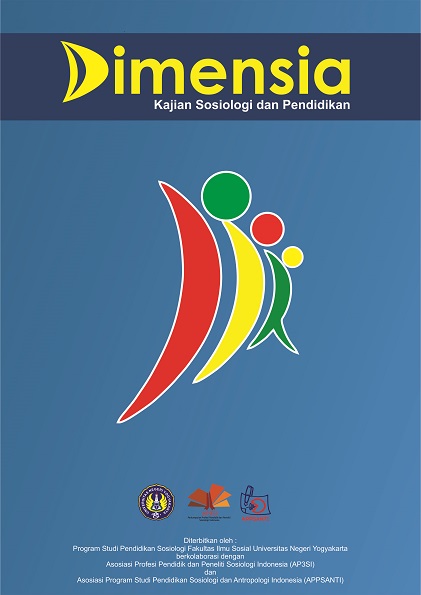Covid-19:Relasi Sosial Siswa di Banten pada Pembelajaran Jarak Jauh (PJJ)
DOI:
https://doi.org/10.21831/dimensia.v10i2.40361Keywords:
covid-19, social relationships, students, distance learningAbstract
The impact of the Covid-19 pandemic on the education sector is the implementation of distance online learning. This weakens the educational system in a variety of ways, including the social sphere.Social activity that used to held in schools is not possible to do that leads to creating barriers to direct social processes among students. As a result, this research aims to explain how the social relationships of Banten local high school students in the distance learning/PJJ situation in the Covid-19 pandemic. This research using the survey method. The findings show that: The quantity of face to face interaction is uncommon and not voluntary.The indirect interaction through media and technology are intense and creating familiarity in indirect online interaction pattern.
References
Abadi, T. W., Sukmawan, F., & Utari, D. A. (2013). Media sosial dan pengembangan hubungan interpersonal remaja di Sidoarjo. KANAL: Jurnal Ilmu Komunikasi, 2(1), 96-106.
Harfiyanto, D., Utomo, C. B., & Budi, T. (2015). Pola interaksi sosial siswa pengguna gadget di SMA N 1 Semarang. Journal of Educational Social Studies, 4(1).
Hollar, Amber. 2008. "Social Experiences in the Classroom",https://sites.google.com/site/crmmprojectsite/Home/chapter-11--relevance-strategy. Diakses 7 April 2021.
Hurst, B., Wallace, R. R., & Nixon, S. B. (2013). The impact of social interaction on student learning. Reading Horizons : A Journal of Literacy and Language Arts, Vol 52, No 4, 2013:376-382.
Jamun, Y. M., Wejang, H. E., & Ngalu, R. (2019). Pengaruh Penggunaan Gadget Terhadap Pola Interaksi Sosial Siswa Sma Di Kecamatan Langke Rembong. JIPD (Jurnal Inovasi Pendidikan Dasar), 3(1), 1-7.
Kemenlu. 22 April 2020. "Kebijakan Pemerintah Republik Indonesia terkait Wabah Covid-19". https://kemlu.go.id/. Diakses 29 Maret 2021.
Maunah, Binti. (2016). Sosiologi pendidikan. Yogyakarta:Media Akademi.
Setiawan, R. (2020). Karakteristik Dasar Literasi Digital dan Relasi Sosial Generasi Milenial Banten. Sosioglobal: Jurnal Pemikiran dan Penelitian Sosiologi, 4(2), 153-173.
Soekanto, Soerjono. (2019). Sosiologi Suatu Pengantar. Depok:Rajawali Pers.
Subadi, Tjipto. (2009). Sosiologi dan Sosiologi Pendidikan. Surakarta: Fairuz Media.
Suci, I. G. S., SE, M. A., Hadion Wijoyo, S. E., SH, S., & MH, M. (2020). Pengantar Sosiologi Pendidikan. Pasuruan: Penerbit Qiara Media.
Widodo,T. (2008). Metode Penelitian Kuantitatif. Solo: UNS Press.
Published
How to Cite
Issue
Section
License
Penulis yang menerbitkan jurnal ini menyetujui ketentuan berikut:
- Penulis memegang hak cipta dan memberikan hak publikasi pertama kepada jurnal dengan karya tersebut secara bersamaan dilisensikan di bawah Lisensi Atribusi Creative Commons yang memungkinkan orang lain untuk berbagi karya dengan pengakuan atas kepenulisan karya dan publikasi awal di jurnal ini.
- Penulis dapat mengadakan perjanjian kontrak tambahan yang terpisah untuk distribusi non-eksklusif dari karya versi terbitan jurnal (misalnya, mempostingnya ke repositori institusi atau menerbitkannya dalam buku), dengan pengakuan atas publikasi awalnya pada tahun jurnal ini.
- Penulis diizinkan dan didorong untuk memposting karya mereka secara online (misalnya, di repositori institusi atau di situs web mereka) sebelum dan selama proses penyerahan, karena hal ini dapat mengarah pada pertukaran yang produktif, serta kutipan karya yang diterbitkan lebih awal dan lebih banyak (Lihat The Pengaruh Akses Terbuka).
====================================================
Authors who publish with this journal agree to the following terms:
- Authors retain copyright and grant the journal right of first publication with the work simultaneously licensed under a Creative Commons Attribution License that allows others to share the work with an acknowledgement of the work's authorship and initial publication in this journal.
- Authors are able to enter into separate, additional contractual arrangements for the non-exclusive distribution of the journal's published version of the work (e.g., post it to an institutional repository or publish it in a book), with an acknowledgement of its initial publication in this journal.
- Authors are permitted and encouraged to post their work online (e.g., in institutional repositories or on their website) prior to and during the submission process, as it can lead to productive exchanges, as well as earlier and greater citation of published work (See The Effect of Open Access).








